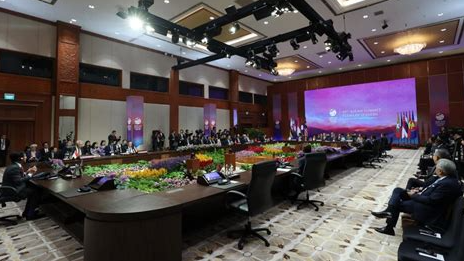Digital and green economies highlighted as critical growth areas for ASEAN’s sustainable development.
JAKARTA: Prime Minister Lee Hsien Loong called for economic integration to remain central to ASEAN’s agenda as the bloc navigates a shifting global economic landscape. Speaking at the ASEAN Summit plenary session in Jakarta on Sept 5, PM Lee emphasized the need to develop growth areas in the digital and green economies to strengthen ASEAN’s relevance and competitiveness in a post-pandemic world.
“With rising global economic fragmentation, ASEAN must act quickly to seize new opportunities while addressing challenges like climate change,” Mr. Lee said, urging leaders to prioritize initiatives that foster collaboration and resilience.
Advancing Economic Integration
PM Lee highlighted the need to upgrade the ASEAN Trade in Goods Agreement (ATIGA) to address emerging issues like digital trade, environmental sustainability, and crisis situations. He also underscored the importance of launching the ASEAN Digital Economy Framework Agreement (DEFA), which aims to boost e-commerce, cybersecurity, and digital payments.
DEFA, expected to add up to US$2 trillion to ASEAN’s digital economy by 2030, was agreed upon by ASEAN economic ministers to be finalized by 2025. Mr. Lee stressed that the framework must drive inclusive growth and improve digital connectivity, skills, and literacy across the region.
Singapore has led by example, signing agreements with Malaysia, Chile, New Zealand, and Canada to enhance cooperation in digital trade, data flows, and electronic payments.
Embracing the Green Economy
The transition to green energy was another key focus. Mr. Lee pointed to projects like the Lao PDR-Thailand-Malaysia-Singapore Power Integration Project as trailblazers for a regional ASEAN power grid. This initiative supports multilateral electricity trading and renewable energy integration, critical for sustainable development.
Mr. Lee also welcomed a feasibility study of the Brunei-Indonesia-Malaysia-Philippines Power Integration Project, which could expand power trading in the region. Beyond the power grid, ASEAN should collaborate on carbon trading and capacity-building initiatives, he added.
Strengthening ASEAN Institutions
PM Lee called for enhancing ASEAN’s institutions and decision-making processes to ensure the bloc’s resilience in emergency situations. Strengthening the ASEAN Secretariat and optimizing the role of the ASEAN Secretary-General are crucial to effectively supporting ASEAN’s priorities, he said.
“A more integrated and well-functioning ASEAN enhances our centrality and competitiveness in the global arena,” Mr. Lee concluded, reiterating the importance of unity and innovation in navigating a rapidly changing world.








